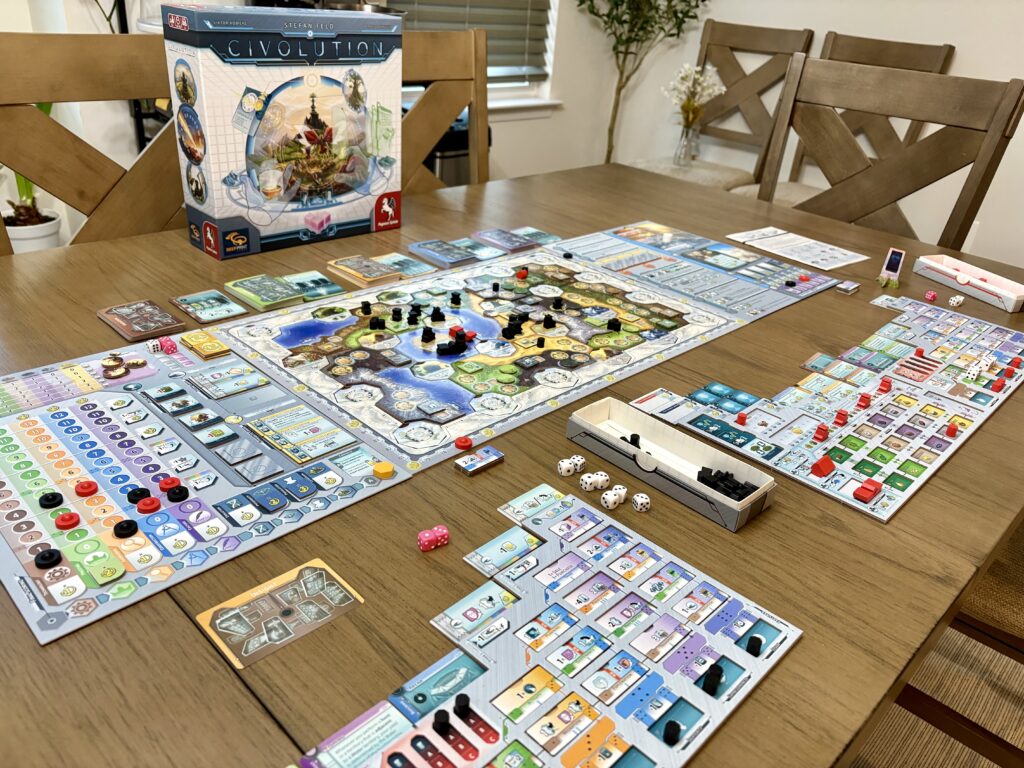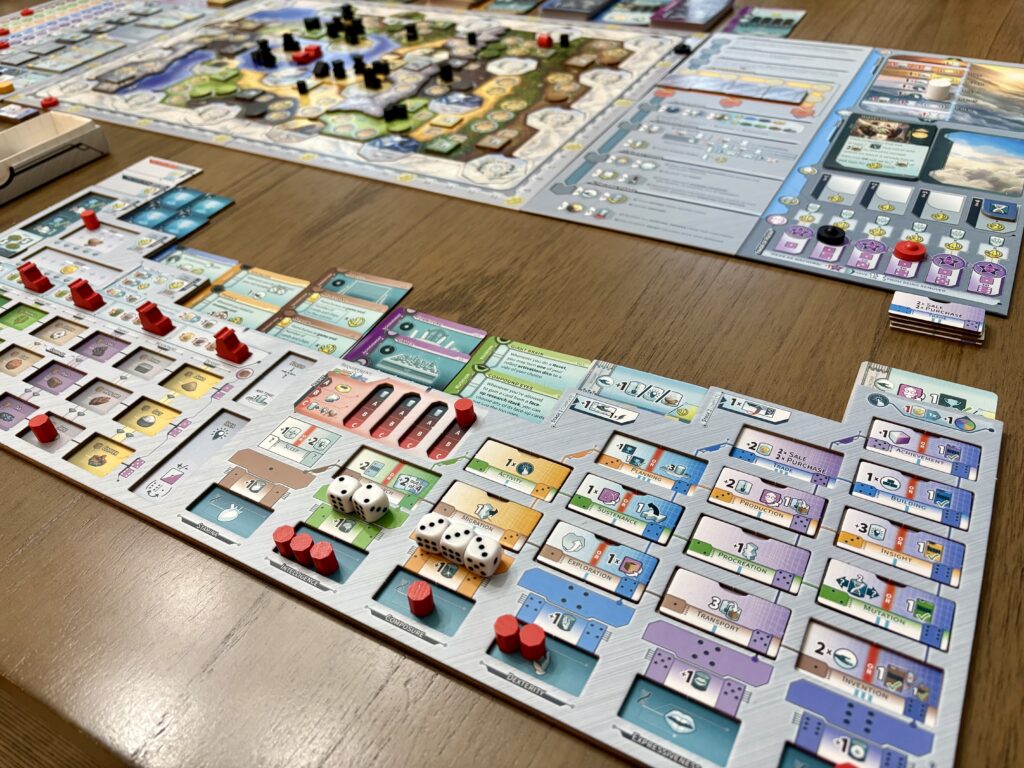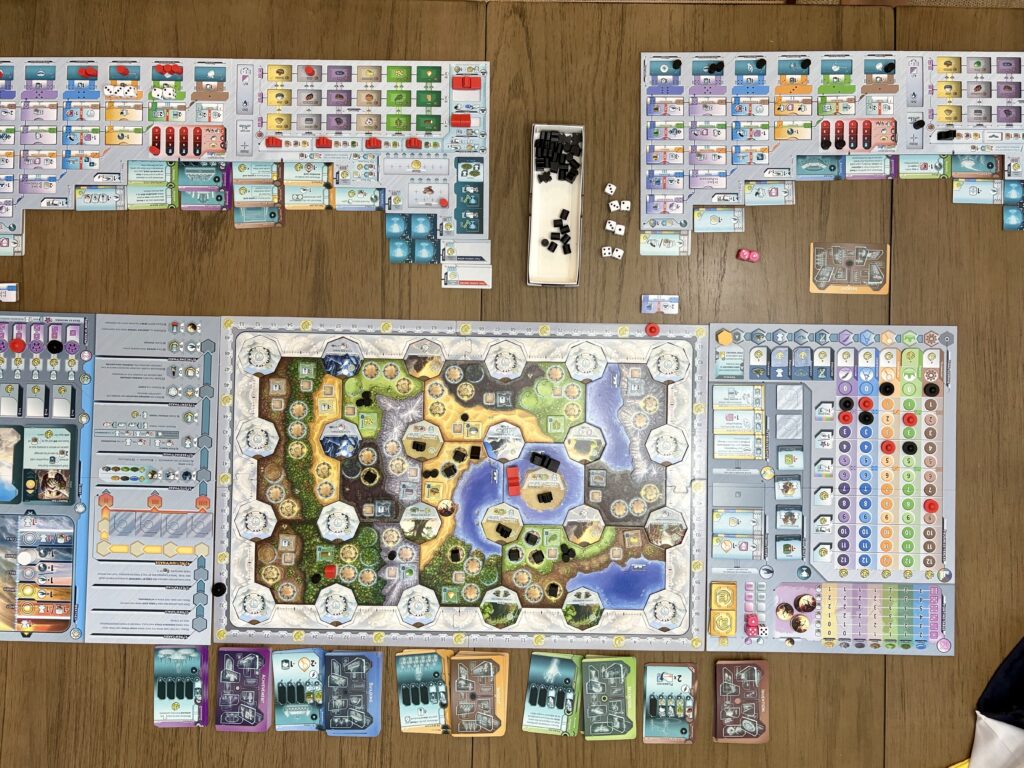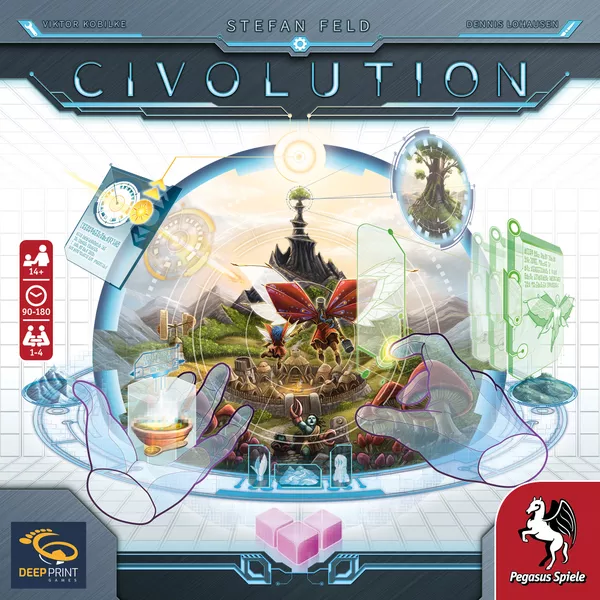Welcome to this week’s review! This week I’m discussing a game that I had the chance to demo at PAX Unplugged last year, but now after more plays, I wanted to see if my thoughts on the game have changed at all. So without further ado, let’s jump into my thoughts.
Civolution
- Designer: Stefan Feld
- Publisher: Deep Print Games, Pegasus Spiele
- Complexity: Heavy
- Time: 90-180 Minutes
- Players: 1-4
- Main Mechanisms: Dice Selection
My first game of Civolution was quite the experience at last year’s PAX Unplugged. I managed to play a four person game with all new players, which took about as long as you might expect for this heavy of a game. The rules teach alone lasted almost an hour and a half by itself. We ended up calling the game at the end of the third round (there are four rounds in the game) because we’d been sitting there almost four hours at that point (including teach). However, even after all that, the game was still among my highlights from the convention, so obviously I was keen to see how the game felt after more plays.

Civolution is designed by Stefan Feld, who is most known for designing The Castles of Burgundy. True to Feld’s designs, there are plenty of dice in Civolution, and the theme takes a backseat to the intricate mechanical systems. Civolution is a “Civilization” themed game where players take turns using two dice to activate an action. There are 15 different main actions, each corresponding to two dice numbers. For example, a five and a two corresponds to the procreation action which allows the player to gain an extra tribe on the map. Players will continue taking turns until there have been enough reset actions, which usually happens when a player runs out of dice and has to reroll, which then triggers the end of the era. Every era has a few events and scoring that happen, and the game ends after four eras.
First off, while there are a lot of different actions, each one feels smooth and quick: use two dice, trigger the action. This means that as long as players have their turns planned out, the actions themselves can be very quick. Also, while the game has its fair share of analysis paralysis, if you feel stuck and don’t know which action to choose, worst case, you can just play an action that corresponds to two dice that you have.
However, my favorite aspect of the game likely has to do with the amount of variety and replayability. I mentioned that there are 15 different main actions, and in each game, you’ll likely focus on a handful of them. Another aspect are the cards. There are five different research decks which you play into a tableau in front of you. These cards may give you immediate rewards, new actions to trigger, or permanent benefits for the rest of the game. Like with the actions, you likely won’t be able to fill out your entire tableau during the game, so you’re forced to pick and choose which areas to focus on. Also, the cards themselves offer plenty of combos that allow you to explore a wide variety of strategies. Finally, I haven’t even mentioned that the map board can be randomized each game, as well as the scoring tiles, goals, and income and attribute chips, which all add to the replayability. There’s so much to be explored in Civolution that I imagine that I could play the game at least another dozen times and each game will still feel fresh and unique.

Considering that multiplayer games can definitely run long, especially if you have to teach the game to new players, I’ve enjoyed playing the solo mode that’s included. The AI opponent is easy to pilot (flip over a card from a deck each round), while still being smart to target certain scoring conditions. The rulebook even mentions that the solo mode is ideal for trying out different strategies and combos. Overall, I wouldn’t be surprised if this ends up being a game that I pull out more often solo than multiplayer because of the solid solo mode and shorter runtime.
Finally, I have to give credit to the extremely detailed player aids in the game. They aren’t quite as clean as the ones I recently praised in Galactic Cruise, but they are still excellent. When I was playing my first game at PAX without having read the rules ahead of time, the player aid came in extremely handy. Also, there is a separate glossary that explains each individual card and chip in the game, so you should never have to resort to combing through forums to understand how specific cards work.
I already hinted on the game length, but that along with the overall weight of the game are the big elephants in the room. The box indicates 90-180 minutes, but I would be hard pressed to finish a solo game in under 90 minutes including setup, and four person games could easily reach the four-hour mark with a rules teach. Also, while the actions themselves are not that complicated, there are still a lot of different mechanisms in the game that need to be explained.
I imagine another common complaint with the game is the luck element. As with most games with dice, there’s bound to be some amount of luck, but since your actions are dictated by which dice numbers you have available, it can feel frustrating when you roll numbers that don’t match the action you had planned for. There are ways to mitigate luck, one of which being spending “idea” tokens to modify your dice value. Another counterargument is that since you roll so many dice in the game, the odds sort of balance out in the end since you’re likely to get both good and bad rolls at some point in the game. However, I imagine the luck element will be a negative for players who don’t like a lot of dice luck or having dice dictate which actions are available.
Finally, though the game is “Civilization” themed, Civolution isn’t the most thematic game. And while the rulebook takes step to try to integrate the theme, most of the mechanical systems are not rooted in a thematic sense. I imagine that you could replace the “Civilization” theme with another euro theme and the game would still feel very similar. The emphasis was definitely on developing the mechanisms first and then trying to integrate a theme around them. This isn’t necessarily a bad thing, but players who are looking for a thematic “Civilization” game will likely be disappointed.

Overall, after more plays, Civolution still feels like the same game I first enjoyed at PAX last year. I can definitely understand how certain players will be turned away by the complexity, length, and luck element, but for those that are able to get over that initial hurdle, there is a satisfying game with tons of variety to be explored. On the surface, the game is difficult to truly articulate the feeling I get playing the game, rather it just feels fun. Civolution is still one of my favorites from last year, and my pick of Stefan Feld’s designs.
With that, I’ll wrap up this week’s review! For those that have played Civolution, what are your personal pros and cons of the game? I’d love to hear your thoughts on any of the games I’ve mentioned or future content suggestions in the comments below. Happy gaming!
If you liked this post and want to be notified when new content is released, then follow me on Instagram @themeepledigest.
